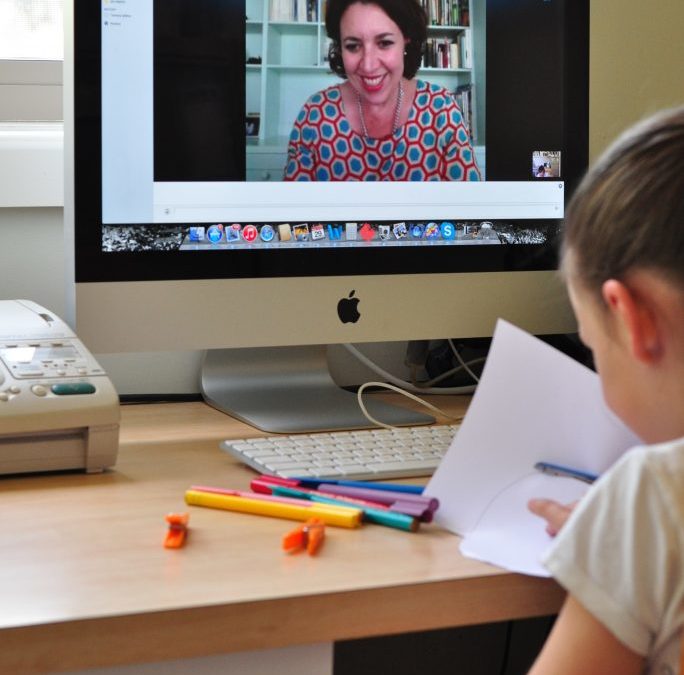Written by Lauren Rozario- Speech Pathology Team Manager
When people hear “online therapy ”, they often imagine virtual sessions full of speech games and social stories, but rarely do they picture eating. That’s why many families, support workers, and even health professionals are surprised to learn that mealtime management and swallowing assessments can be completed safely and effectively through online speech therapy.
The truth? With the right expertise, online speech pathology is clinically valid tool for supporting safe eating. In fact, they’re transforming access to swallowing assessments and NDIS speech therapy across rural, remote, and urban communities alike.
Let’s bust the myth: online therapy can support safe swallowing—and it does.
What Is a Mealtime Management Plan?
A Mealtime Management Plan is a personalised document created by an online speech therapist. It outlines practical, evidence-based strategies to support individuals with dysphagia (difficulty swallowing). The plan may include:
- Specific food textures and drink consistencies
- Supervision levels
- Safe eating positions
- Adaptive equipment
- Environmental and behavioural support strategies
These plans are essential for therapy connect teams—including families, carers, support workers, and residential staff—who rely on them to deliver consistent, safe support at mealtimes.
Why Would Someone Need a Mealtime Management Plan?
If someone is suspected to have swallowing difficulties—known medically as dysphagia—a Mealtime Management Plan helps reduce risk and improve safety during eating and drinking.
So… What Is Dysphagia?
Dysphagia refers to problems with swallowing, chewing, or safely moving food and fluids from the mouth to the stomach. It can happen to anyone but is most common among individuals with:
- Neurological conditions (e.g. Cerebral Palsy, stroke, Parkinson’s)
- Developmental or intellectual disabilities
- Age-related physical decline
Why Is Dysphagia Dangerous?
Left unmanaged, dysphagia can lead to:
- Choking or aspiration pneumonia
- Malnutrition and dehydration
- Anxiety or distress at mealtimes
- Reduced quality of life
That’s why early assessment and a tailored mealtime management plan are often essential—and not just helpful—for safety and wellbeing.
Dysphagia & Online Therapy – Yes, It Works!
Many families don’t realise that speech therapy online—yes, even for something as hands-on as swallowing—is not only possible, it’s evidence-based. Our team Speech Pathology team at Therapy Connect use best-practice strategies to complete thorough assessments.
Whether you’re working with an occupational therapist online, an online psychologist Australia-based clinician, or a speech pathologist, telehealth brings expert care to you—no matter where you live.
What to Expect During a Telehealth Swallowing Assessment
Session 1: Case History
Your online therapist Australia-based speech pathologist will gather detailed background information, including:
- Medical diagnoses and medication history
- Choking, coughing, or “wet” voice after eating
- Mealtime behaviours and routines
- Weight changes or chest infections
This creates a full picture of the individual’s needs and risk factors.
Session 2 & 3: Mealtime Observations via Video
Over two virtual sessions, your online speech therapist will:
- Observe chewing, posture, and swallowing across real meals
- Assess tolerance of different textures and fluid types
- Monitor fatigue or behavioural changes at different times of day
- Complete an oro-motor assessment (lips, tongue, jaw movement)
These sessions are conducted in the comfort of the participant’s home, helping to reduce anxiety and capture a natural, realistic picture of mealtime functioning.
What You’ll Receive
After assessment, you’ll receive:
✅ Swallowing Assessment Report
A clinical report summarising findings, symptoms, risks, and recommendations.
✅ Mealtime Management Plan
A practical, detailed plan for daily support teams, including:
- Food/fluid guidelines
- Seating and support strategies
- Equipment recommendations
- Risk mitigation and monitoring strategies
These reports are crucial for support coordinators, families, and multidisciplinary teams—including NDIS dietitians, online occupational therapists, and autism therapists.
✅ Final Thought: Online Therapy Isn’t a Limitation—It’s a Solution
Dysphagia is a serious health concern—but one that can be safely and comprehensively addressed without needing to leave your home. Online therapy removes barriers like travel, mobility, and waitlists, and allows clinicians to observe eating in a familiar, natural environment.
So if someone tells you swallowing assessments can’t be done via telehealth, you can confidently say:
Myth Busted.
Need More Info?
If you or someone you support is showing signs of swallowing difficulties, speak to your GP or get in touch with a speech therapist Australia-based provider. At Therapy Connect, we offer assessments and therapy tailored to your needs—wherever you are in Australia.
Reach out today to learn more about speech therapy online, occupational therapy online, or Allied Health Therapy through telehealth. We’re here to help.




